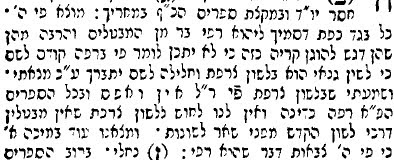Summary: Fi means pooh! or bother! in French. When the word precedes Hashem, should we change it to Pi?
Post: I saw a fun Minchas Shai for parashat Ekev this week. The pasuk in question:
There is a kametz aleph at the end of מוצא and a conjunctive accent, the mercha. Therefore, the peh in פי-ה is fricative, without a dagesh. This is as it should be, following a general rule.
However, Minchas Shai records a different developed tradition:
That this "fi-Hashem" among others was changed to "Pi Hashem" because "fi" is a negative statement in Frenchm and chalila to say this about Hashem. Minchas Shai elaborates that he heard that, in French, "fi" means nothing and zero. And that meanwhile, in all the sefarim, it is a fei without a dagesh, according to its law, and we should not worry about the French language, for we do not nullify the normal way of the Holy Tongue because of other languages. Further, he refers to another fi Hashem in the first perek of Michah.
This is indeed an interesting tradition which developed, even if it was discarded. I can think of theories of krei and ketiv along similar lines - that some of the krei and ketiv, such as yishkavena / yishgalena, developed because the original yishgalena developed a rather crude connotation. So too techorim / afolim. That people would organically suggest modifications to the way it should be read for such practical concerns of implications in the mind of present-day listeners is a nice example of a living tradition of developing masorah. Still, I can understand why reject it.
(Also, I don't know enough French or Old French; but I don't get nada, nothing. Perhaps 'pas', an adverb meaning 'not'? But I would guess that what was meant was "fi", corresponding to English "pooh!" and "fie".)
Perhaps this is a reach, but I would propose something else. In Baruch She'amar, there is a rather strange variant nusach. Instead of hamehullal be-fi amo, that Hashem is praised in the mouth of His people, some have it as be-feh amo. This is mystifying. Feh is the absolute form, whereas we should have the construct form, based on the rules of dikduk.
But maybe this is the solution. I don't know where people began saying it, but what if it came from this negative meaning of fi in French. Because of the preceding bet, and the preceding sheva, the letter פ would indeed be fricative. It is be-fi rather than be-pi. It is mildly insulting, in a poem about praising Hashem, to say that He is praised in the "fi" of His nation. And so, perhaps rather than adding a dagesh, as in the pasuk Minchas Shai discusses, someone changed it to the absolute instead of construct. They knew that this violated the rules of dikduk, slightly, but there is good cause for this deviation, because of the negative implication for French speakers.



12 comments:
The Nusah of "בפה עמו" is Kabbalistic. The Ben Ish Hai mentions it (in אות ז), quoting the ספר הכונות, which is synonymous with the פרי עץ חיים, which I found here (see ד"ה אך יש).
thanks. that certainly adds a good explanation to it, but i am not entirely convinced.
rav chaim vital speaks about it as competing nuschaot, not that one should change it:
לכך צריך לומר בפה עמו,
ולא בפי עמו. כי בפה גי׳ פ״ ז תיבות שבנוסח זה
many times there are kabbalistic explanations for existing phenomena, where the kabbalistic reason was tacked on later, rather than being the primary cause.
On the contrary. I believe that from his wording, he's saying that one should change it to בפה.
About Kabbalistic explanations being tacked on later, you're only correct to an extent. In some cases, it is exactly as you say. In other cases, the Peshat reason was widely known, whereas the Kabbalistic reasons were only passed down to Yehidei Segula. Nowadays (in the past 500 years), Kabbala has been more widespread so it became known to a wider audience. Whether the Peshat reason or the Kabbalistic reason is the primary cause, I'd say זה וזה גורם.
Naftali Weider discussed fi/fe in his article on influences of non-Hebrew words on the liturgy. The bibliographic details are here. I don't have a scan of it so I can't send it to you, although a summary of his conclusions can be found here.
wow! thanks. and baruch shekivanti.
to summarize, he found an overall general change of Pi to Peh, including in the piyut of kel adom, earlier than the Arizal (and R' Chaim Vital), marked in siddurim, everywhere pi was found. and he explains it the same way i suggested, that pi was gnai in French and German.
kol tuv,
josh
I was going to say Baruch Shekivanta.
Now, according to this explanation, since we in America use "Feh!" as a derogatory term, should we revert back to "Fi"?
:-)
thanks, and heh. :)
maybe we should change it further to be-Peh. after all, if we are discarding dikduk, this is admissible. and we still have the kabbalistic gematria. and it accords with the common speech pattern of many people today. (who says metzitza be'feh, instead of be'peh?)
kt,
josh
Josh,
I also meant to add "baruch she-kivanta," but I got called away to do something.
Actually, I didn't realize that "Feh" is really from Yiddish, so it's not just America - all Ashkenazic communities would have a problem with "Feh". I guess I'm safe saying it then. :-)
thanks
I felt proud of myself in shiur a few years ago when people started copying my pronunciation of makeh bephatish ;-)
I think we need to stick with the "Torah Shel baal PEH"
and not make any changes
Post a Comment